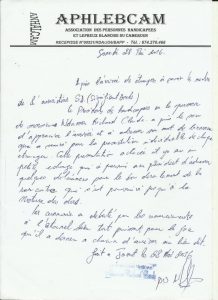ANHALCAM/ APHLEBCAM( Association des Personnes Handicapes et Lepreux Blanchis du Cameroon)

According to an article by Christian Johnson in 2016, leprosy is the oldest disease known to humanity, as recent genomic studies have traced Mycobacterium leprae, its causative agent, along human dispersal in the past 100,000 years. It affects peripheral nerves, the skin and mucosa of the upper respiratory pathways. Transmission is believed to be through nasal droplets or prolonged skin contact with an untreated patient, however, the exact mode of transmission is still unclear. Untreated patients or those diagnosed late would develop irreversible disabilities and disfiguring complications. These physical complications associated with socio-cultural construction of leprosy are responsible for stigma and social exclusion of victims.
The social exclusion of victims in less developed countries like Cameroon is even more intense and dramatic as the patients are abandoned and live in extremely poor and unhealthy conditions. Though at the end of 2000, leprosy elimination was achieved globally and in107 countries (including Cameroon) out 122 countries that were considered endemic in 1985. Leprosy is said to have been eliminated in Cameroon in 2000 yet some health regions and health districts (HD) have continued to report significant numbers of cases and Significant Deeds’s visit in June 2016 at ANHALCAM/ APHLEBCAM helped us confirm this.
Our visit was surely not aimed at investigating the successful eradication of leprosy in Cameroon but at showing love and compassion to people like us who do not deserve the predicament they face each day. The items (rice, pasta, tissues, cooking oil, soaps, clothes and money) we donated did not change the society’s perception of leprosy or her treatment of lepers but reminded these people that though their inclusion and acceptance into the society as normal and able people was very slow, it was surely not stagnant based on our presence.
Very little had to be said the 29 people we saw living on this site as the conditions we saw they lived in during the couple of hours we spent there said more than enough. It was a sad experience for most of us who had not been exposed to lepers before or who have since childhood be taught to avoid these people. It was sad because we discovered how uninformed we were and how uncaring and selfish we have always been.
Being more knowledgeable now, our mission as S.D members through this article is to instruct you dear reader that love , compassion and understanding matters and should not be limited to people we choose fit to deserve it but should be extended to all without exception, able or disabled.Being healthy is not achieved by our might but by God’s grace.
Leila Magoum




0 Comments